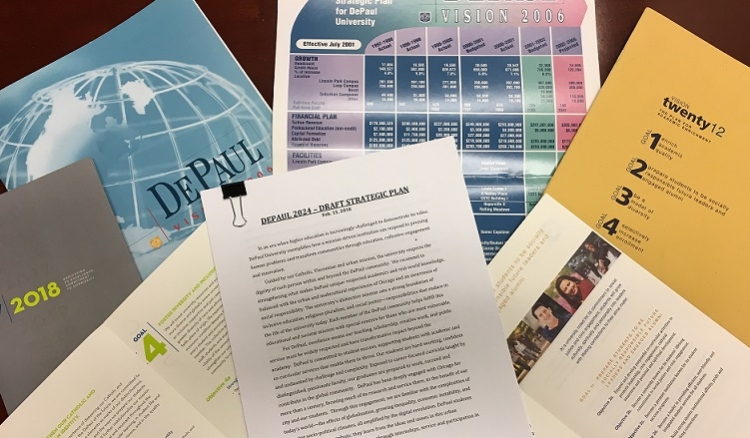 DePaul has a strong history of using strategic plans to enhance student success. A draft of the latest plan is now circulating for input at town hall meetings March 13 and 14. (DePaul University/Denise Mattson) Intrigued by what is under consideration in DePaul's next strategic plan? Faculty, staff and students are invited to town hall meetings March 13 and 14 to discuss the draft plan and offer feedback on the priorities that have begun to take shape.
DePaul has a strong history of using strategic plans to enhance student success. A draft of the latest plan is now circulating for input at town hall meetings March 13 and 14. (DePaul University/Denise Mattson) Intrigued by what is under consideration in DePaul's next strategic plan? Faculty, staff and students are invited to town hall meetings March 13 and 14 to discuss the draft plan and offer feedback on the priorities that have begun to take shape.After months of gathering input and synthesizing a draft, the university is circulating the initial version to gather additional input before the representative university-wide planning task force reconvenes to craft a final draft for Board of Trustees review and approval in May.
MARCH 2018 TOWN HALL MEETINGSTuesday, March 13
3:30 - 5 p.m.
Lincoln Park Campus, Cortelyou Commons
Wednesday, March 14
10 - 11:30 a.m.
Loop Campus DePaul Center, room 8005
Jay Braatz, vice president for strategic planning and presidential administration, chairs the planning task force that reviewed and integrated the recommendations proposed by four planning teams.
"It was an enormous undertaking, and I appreciate the seriousness with which the planning teams and Strategic Planning Task Force took their charges," she says.
Forty-two faculty, staff and students from across the university were involved in the planning process directly through their roles on planning teams and the task force. Expert advice and strategic recommendations were solicited from groups such as the President's Diversity Council, the Executive Retention Group, the University Council on Community Engagement and many others. About 300 people attended meetings to share input, and about 150 comments were submitted to the president's website.
The Strategic Planning Task Force worked throughout January and early February to identity points of intersection and overlap in the planning team reports, nearly 80 pages in total and included more than 100 strategic objectives.
Braatz says there were significant points in common as teams identified the most important strategic priorities for university focus. In the end, the task force advanced five draft strategic priorities. The first addresses mission, diversity and inclusion; the second focuses on student success and preparation to live and work in a global society; the third promotes access in its broadest sense; the fourth encompasses academic excellence and faculty work; and the fifth outlines strategies to support DePaul's long-term fiscal strength.
The Board of Trustees task force, which articulated the planning guidelines to help inform the process, reviewed the draft. The full board will discuss the draft in depth at the March 1 trustee meeting.
"Their primary message was a clear green light of what has been produced and a genuine thank you for all the work faculty, staff and students put into developing the draft," Braatz says. Additional feedback will be incorporated into the next draft.
This draft also responds to initial feedback from President A. Gabriel Esteban, Ph.D., and his cabinet, the provost, Faculty Council and Joint Council. As the task force takes the plan forward to the university for comment, the draft also will be discussed at upcoming representative council meetings, including a meeting with Staff Council on Feb. 28; a second review with Faculty Council on March 7, and an opportunity for the Student Government Association to weigh in at its March 8 meeting.
Faculty, staff and students are encouraged to attend town hall meetings to discuss the draft plan and to submit comments on the president's website.